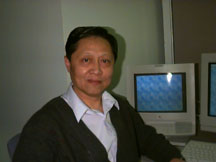
 |
Readings in Modern Chinese |
Course Description
Chinese 461-462. Readings in Modern Chinese. Chinese 406 equivalent. (5). (Excl). (If you did not complete at least 6 years of regular school education in the Chinese language and have not taken Chinese 406 at The University of Michigan, you must take a placement test to certify your proficiency. The test will be given on the eve of the first day of classes for a new semester. Please contact the ALC Department at the end of the previous semester to learn the time and location)
Readings in Modern Chinese is a two-term Chinese language course sequence with graded readings at an advanced level. Texts chosen from a variety of sources in both Mainland China and Taiwan include 20th century fiction and essays on various topics. While students are helped to further improve command of structure and vocabulary in a range of language styles, the primary emphasis of the sequence is on reading comprehension with the aim of enabling students to read original materials with less reliance on a dictionary. Development of speaking and writing skills will also be stressed through discussions on the readings. In the second term, more longer texts will be used, and efforts will be made to improve reading skills and speed. At times when Chinese 431-432 (Contemporary Social Science Texts) is not offered simultaneously, a social science component may be arranged to accomodate to the wider interest and demand of students. Daily attendance, weekly assignments and quizzes as well as unit tests are required. There is no final exam. Classes are conducted largely in Chinese.
Classes: 1pm-2pm; MWF, 1406 MH; TTh, 2402 Modern Languages Building
Instructor: Qinghai CHEN
Office: 3083 Frieze Building (Tel: 764-9111; E-mail: chenq@umich.edu)
Office Hour: 2pm-3pm, TTh, or by appointment
General Objectives:
Chinese 462 is the second half of a two-term sequence designed to help advanced
students of Chinese to further develop their ability of reading and understanding
materials in modern Chinese. While students are helped to further improve command
of structure and vocabulary in a range of literary styles, the primary emphasis is on
reading comprehension with the aim of enabling students to read original materials
with less reliance on a dictionary and at a faster speed. Development of speaking and
writing skills will also be stressed through discussions on the readings. At times
when Chinese 432 (Contemporary Social Science Texts) is not offered simultaneously,
a social science component may be arranged to accomodate to the wider interest and
demand of students. Classes will be conducted largely in Chinese.
Texts: Course Pack Chinese 462
(Kolossos Coursepacks, 310 E. Washington, Ann Arbor, Tel: 994-5400)
Activities:
General Arrangement: Instruction will be organized into 5 units as specified in the
attached tentative plan. Besides reading materials, every unit will also provide training
in reading skills.
1. Out-of-class preparation
Before you come to class, you have to cover designated materials according to
specific requirements.
2. Discussions based on individual preparations
Always try to come to class with questions.
3. Homework assignments
Given once or twice a week, such as vocabulary/grammar exercises, memorization,
translation, and compositions.
4. Quizzes (vocabulary or dictation or writing from memory or any combination)
Given every Monday (or Tuesday if there is no Monday class).
5. Tests
Given at the end of every instructional unit, i.e., on Fridays of Weeks 3, 6, 8,
12 and Tuesday of Week 16.
Grades:
Attendance 10% (1% off for each absence after 2 absences)
Homework 30% (Late work accepted with penalty)
Quizzes 20% (Drop the lowest one; NO make-ups)
Tests 40% (NO make-ups without pre-approval)
All your grades from a specific category of requirement will be added and
converted to a percentage according to the designated weight. The sum of
the four percentages will lead to your final grade as follows:
96-100 A 91-95 A- 86-90 B+ 81-85 B 76-80 B- 71-75 C+
66-70 C 61-65 C- 56-60 D+ 51-55 D 46-50 D-
Schedule: (Ask instructor)
-->
Return to List
Courses I Teach